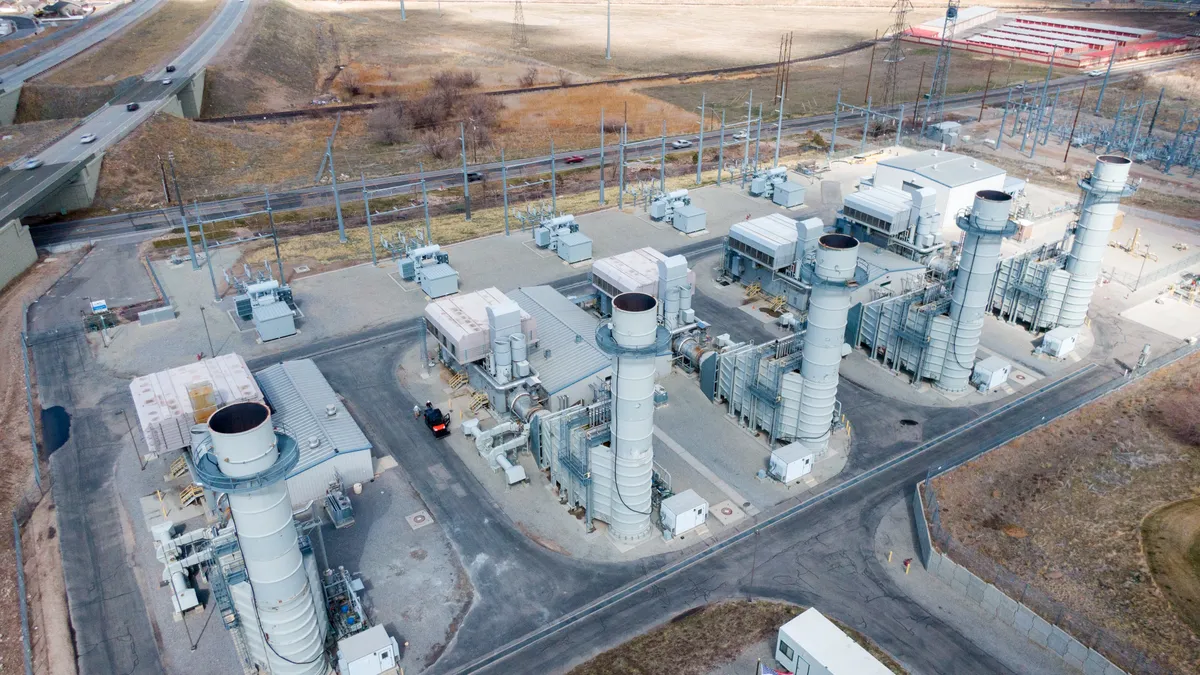Dive Brief:
- Four governors, nine state utility commissions, ratepayer advocates and others are backing a complaint that seeks to lower the PJM Interconnection’s capacity auction price cap, according to filings with the Federal Energy Regulatory Commission.
- Constellation Energy Generation, the Electric Power Supply Association and the PJM Power Providers Group oppose the complaint filed last month by Pennsylvania and Gov. Josh Shapiro, D. “Granting the complaint would send a ‘wait-and-see’ message to investors which will further undermine resource adequacy and reliability objectives of the [capacity market,]” EPSA, a trade group for power plant owners, told FERC on Tuesday.
- Utility companies Exelon and FirstEnergy urged FERC to consider alternatives to PJM’s capacity market that could bring new power supplies online quickly. “We stand ready to work with our states on novel solutions in addition to [the capacity market] to ensure our customers are protected and are assured affordable and reliable electricity,” Chicago-based Exelon said in a Tuesday filing.
Dive Insight:
The dispute over lowering the capacity auction price cap is part of a series of actions — including a complaint by ratepayer advocates and proposals from PJM to change elements of its capacity auction to help bring power supplies online — triggered by PJM’s last capacity auction held in July. The auction produced record high capacity prices that will cost ratepayers across the grid operator’s footprint $14.7 billion for the delivery year that begins in June, up from $2.2 billion in the previous auction.
Shapiro and Pennsylvania contend that generating companies won’t be able to bring new power supplies online to respond to higher capacity prices for at least several years, making those high prices unjust and unreasonable.
FERC should order PJM to lower its price cap to no more than 1.5 times Net Cost of New Entry, or Net CONE, for the next two capacity auctions, according to the Pennsylvania complaint. If FERC doesn’t have enough time to address the complaint, the agency should push out PJM’s next capacity auction from July to December, Shapiro and the state said in the complaint.
Supporters of the complaint include the governors of Delaware, Illinois, Maryland and New Jersey. “The temporary nature of the price cap adjustment will allow the market to adjust to PJM’s amended market rules, as well as provide time for PJM to address the severe backlog in its interconnection queue,” the governors said in a Friday filing at FERC.
PJM reform proposals, such as incorporating reliability must-run resources into the capacity market, removing some barriers to the surplus interconnection process and imposing a must-offer obligation on all resources, aren’t enough to protect customers from capacity prices that could rise as much as $20.4 billion above what can be justified by market fundamentals, the governors said.
The Organization of PJM States, Inc., also supported Pennsylvania’s price cap complaint. “Granting the complaint would not only protect customers from being assigned costs that are excessive to incent new generation, but do so in a way that is more than adequate to provide generators the revenues needed to remain online,” OPSI, which represents state utility commissioners, said.
Commissions from Indiana, Michigan, North Carolina, Ohio and Virginia abstained in the vote on the filing.
American Municipal Power, which supplies wholesale electricity to public power utilities, also backed the complaint, but said it didn’t go far enough and amounted to ineffective “tinkering” with PJM’s capacity market.
AMP urged FERC to direct PJM to focus on inclusive discussions that more holistically address resource adequacy concerns in the grid operator’s footprint. The wholesale power supplier also said FERC should lower the capacity price cap to be equal to Net CONE.
The complaint is supported by ratepayer advocates from Illinois, Maryland, New Jersey, Ohio and the District of Columbia as well as advocacy groups that include Earthjustice, Natural Resources Defense Council, Sierra Club and Sustainable FERC Project.
Generators oppose complaint
Meanwhile, EPSA contends Pennsylvania failed to show PJM’s existing capacity market price cap should be changed.
“The fact that a single auction results in elevated prices in response to supply constraints does not mean that the tariff is unjust and unreasonable — it means that the auction is working and sending price signals that are consistent with reliability needs,” EPSA said.
Given rising demand and retiring power plants in PJM, it should be expected that capacity prices would rise, according to EPSA.
“A single capacity auction resulting in high prices does not prove that the market design is unjust and unreasonable,” EPSA said. “Market participants make market entry and exit decisions over the long term. Those decisions are not based on the results of a single auction.”
Power plant owners contend the complaint would stifle the addition of new electricity supplies at a time when electricity demand is increasing.
“Stable, investment-supporting prices are critical to solving the challenges facing the PJM region,” Constellation said in response to the Pennsylvania complaint as well as the one from consumer advocates. “Granting the complaints will only serve to mute the market’s signals for new entry and make matters worse.”
FERC on Friday extended the comment period on the complaint to Jan. 28. PJM hasn’t taken a position on the complaint yet.
PJM’s board shares Shapiro’s concern about how higher capacity prices will affect consumers, according to a Jan. 16 letter from the board to the governor. “We are simultaneously concerned about market changes that could serve to thwart new generation entry,” the board said. “This new entry is needed to preserve system reliability and ultimately reduce costs for consumers.”














